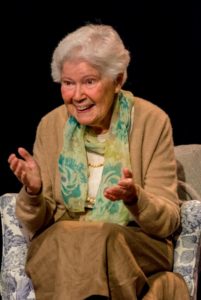I felt when I left the house tonight that I could easily have stayed home and been content listening to the rain on the roof with a cat on my lap. Still, I had asked my editor a month ago if I could review Alice’s Gift; I was intrigued by the subject matter. It turns out I was right to trust my instincts and make the journey out to see this play.
Directed by Kate Rubin, Alice’s Gift (which was performed for two nights last weekend) is a musical play written by Canadian playwright Elisabeth Wagner that’s inspired by the story of musician and Holocaust survivor Alice Herz-Sommer. Alice’s Gift tells in a memoir style how Alice survived years in World War II by playing piano recitals in the ghetto camp Theresienstadt. By the time she died in 2014, Herz-Sommer was 110 years old, the world’s oldest Holocaust survivor.

The play’s set is Alice’s living room, while the audience members are taken on a touching if somewhat mismatched journey through her experiences. The idea behind the play is that Alice has been asked the question “How did you survive?” Alice, played by Lina de Guevara, survived the terrors of the war because of the music that she continually played, and de Guevara really captures that essence of Alice’s character, showing eloquence,strength, and humour when she’s asked to remember something horrifying.
Alice’s recollections are not linear at all—she keeps breaking off and remembering pieces of music that have been meaningful to her. The music has actually kept her intact, emotionally and physically, and has no doubt served as an outlet for Alice for most of her life. Wagner not only wrote the play, but also proves herself to be an accomplished piano player in it, playing Bach, Chopin, and Beethoven, while often sitting alongside Alice and accompanying her storytelling.
Although the play is one act, with only one speaking role, it still overflows with emotion and character. I couldn’t help but be pulled into Alice’s world, learning about her childhood, her years in the concentration camp, her marriage and child rearing, as well as her living in Israel after the war.
Alice’s story, accompanied by the sincerity of the piano playing, only reinstates itself as the play finishes. In one of her final moments with the audience she explains, without a hint of bitterness, that her experiences, all of them, have only made her life richer. Now that’s something to chew on for a bit.
